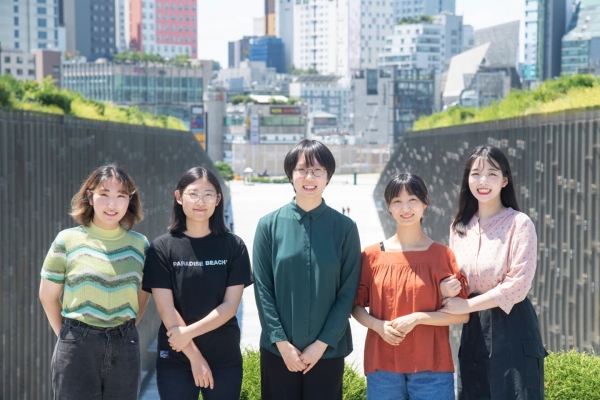
Gae-mat-sal team, which consists of five Ewha students, won the grand prize at the 2021 University Innovation Forum. They were awarded for creating an educational mobile game, “Ruru and Chichi’s adaptation to the Earth,” aimed to help children, including children with developmental disabilities. Not only the students but also the school was praised for providing programs that support the direction of future education.
The members of the Gae-mat-sal team are students from four different majors, Jeong Yu-eun (Department of Special Education), Ju Hoon-jae (Department of Korean Language Education), Hwang Ju-yie (Computer Science and Engineering), Jang Jae-won (Computer Science and Engineering), and Lee Do-hyeon (Brain & Cognitive Sciences). This whole journey started from the Challenge Semester program held at Ewha starting 2020’s fall semester.
The members thought that there was not enough educational game content for children with disabilities in society. This led them to create “Ruru and Chichi’s adaptation to the Earth,” which is a mobile game that aims to encourage children to acquire basic skills they need in their daily lives.
“Young children, especially those with developmental disabilities, often have a hard time acquiring essential skills for daily life, such as eating by themselves and washing hands,” Jeong said. “The COVID-19 has worsened the situation as children inevitably spend more time at home rather than going to school. As a result, we thought that all children needed the means to learn basic skills and that mobile games could be an interesting and effective tool.”
The game starts with two alien characters Ruru and Chichi learning various skills needed for their daily lives after coming to earth. Based on this plot, children can practice and learn eight different skills: washing hands, brushing teeth, cleaning their room (classifying toys), having meals with good manners, dressing according to the weather, socializing with friends, and purchasing products. As the children complete each mission, they are rewarded with compliment stickers and additional decorations on the game screen.
“At first, we came up with two reasons to develop a game for children with developmental disabilities,” Lee said. “These children usually lack concentration and are often uninterested in learning new things. Also, it is easier for them to get into the state of learned helplessness, as they experience more failures compared to their peers.”
The team thought games would be a great source particulary for the children with disabilities as they would easily gain interest and feel a sense of achievement as they receive rewards throughout the game. However, as the project progressed, the members received feedback from a number of experts that independent living skills are needed for all children, not just for those with developmental disabilities. As a result, the team modified the identity of the game to a universally designed game for all children.
Ju explained their special effort for the project. The team initially planned to meet various special education teachers, parents, and children with developmental disabilities so that they could reflect their research to the game. However, they could only have limited written interviews due to the pandemic. As an alternative, all members volunteered at the Ewha Womans University Center for Child Development and Disability every week to observe how children with developmental disabilities acquire basic skills from their teachers. The members’ learning experiences were reflected in the game.
Hwang mentioned that the team is also working on developing an application of the game. The members studied the game engine Unity and C# scripts by taking related lectures and studied various tools needed for graphic work.
“We are currently looking for errors and improvements through alpha testing,” Jang said. “After enhancing the overall quality, we plan to go through the beta testing by testing parents and children. Finally, we will make some final touches and launch the app on the Google Play Store.”
“We hope the game will help children,” Hwang said. “Furthermore, we hope that more educational content aimed for children with disabilities could be made.”

